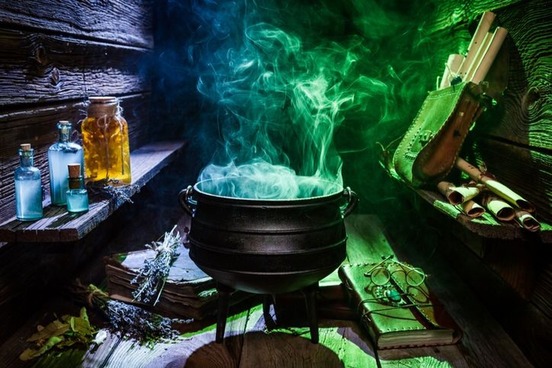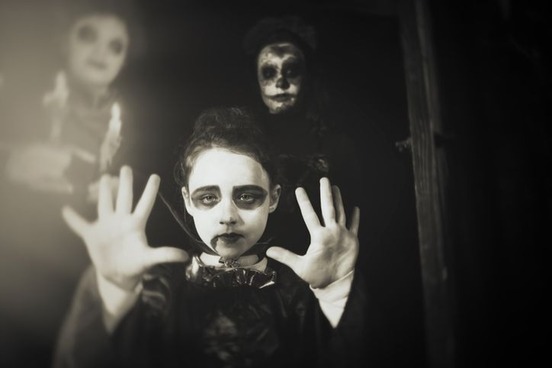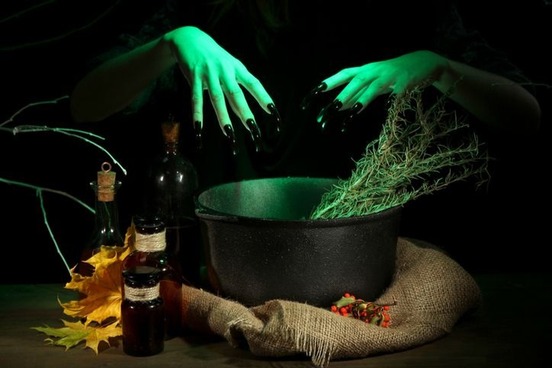
Necromancy
noun 1 : conjuration (see CONJURE sense 2a) of the spirits of the dead for purposes of magically revealing the future or influencing the course of events 2 : magic, sorcery
The first part of necromancy has its roots in the Greek word nekros, meaning "dead body" or "dead person." The second part has its roots in the Greek word manteuesthai, meaning "to divine, prophesy." Necromancy was practiced in ancient times by the Assyrians, Babylonians, Egyptians, Greeks, Romans, and Etruscans, but in medieval Europe it was condemned by the church and could get you in a bit of trouble.

Goety
noun : black magic or witchcraft in which the assistance of evil spirits is invoked
If you're looking for an obscure and archaic term for black magic, go no further than goety. Necromancy can do the trick too, but why settle for the less obscure and more pedestrian term? Goety also has a related adjective, goetic, which, helpfully, does not recall the word romantic, as the adjectival necromantic does.
Goety (which chillingly traces back to a Greek word meaning "to groan, weep, lament") is historically contrasted with theurgy, which refers to the art or technique of compelling or persuading a god or beneficent or supernatural power to do or refrain from doing something.

Bruja
noun : witch, sorceress
Bruja has been referring to witches in English since the 19th century, but it was doing that job in Spanish long before that. Unlike most Spanish words, bruja (and its masculine counterpart brujo) comes not from Latin but from a non-Indo-European source, from an unknown word that is also ancestor to Portuguese bruxa and Catalan bruixa, meaning "witch." It is unrelated to brouhaha, which is believed to trace back (via French) to a Hebrew phrase meaning "blessed be he who enters."

Diablerie
noun 1 : black magic : sorcery 2 a : a representation in words or pictures of black magic or of dealings with the devil b : demon lore
Like the more common diabolical, which means "of, relating to, or characteristic of the devil," the 18th century French borrowing diablerie traces back to Latin diabolus, meaning "devil." Diabolus, however, has less sinister (though still unpleasant) roots: the Greek diabolos, meaning "slanderer."
Diablerie is sometimes applied when no devilry or magic is involved: the word also refers to mischievous conduct or manner, as in "the children's playful diablerie."

Lamia
noun : a female demon : vampire
When hiring babysitters, avoid all lamias. As a common noun, lamia refers to a female demon. The word comes from Greek lamia, meaning "devouring monster." In Greek mythology, Lamia was known in particular for devouring children. She started out nice enough: a lovely queen of Libya who hooked up with Zeus. Zeus's wife Hera did not take the news kindly, robbing Lamia of her Zeus-born children, to which the aggrieved Lamia responded by killing other people's children—as many as she could. Lamia went on to be featured in the scare tactics of Athenian mothers and in literature by the likes of John Keats.

Sympathetic magic
noun : magic based on the assumption that a person or thing can be supernaturally affected through its name or an object representing it
Sympathetic magic posits that the relationship between a person or thing and something that represents that person or thing can be exploited by those with numinous intents. The term dates to the early 20th century, when Western anthropologists were trying to develop a universal definition of magic:
Heir to the eighteenth-century Positivist assumption of "laws" governing nature and society, [British anthropologist James] Frazer said that sympathetic magic was of two types. "Homeopathic" magic works according to the "law of similarity"—things or actions that resemble other things or actions have a causal connection. "Contagious magic" obeys the "law of contact"—things that have been either in physical contact or in spatial or temporal association with other things retain a connection after they are separated.
— Phillips Stevens, Jr., The Skeptical Inquirer, November/December 2001

Incantation
noun : a use of spells or verbal charms spoken or sung as a part of a ritual of magic; also : a written or recited formula of words designed to produce a particular effect
Incantation traces back to the Latin cantare, meaning "to sing"—the same source of the words chant and enchant. Another cantare word is the archaic, obscure, and semantically unexpected excantation, which refers to an act of freeing by enchantment.

Gramarye
noun : necromancy, magic, enchantment
Gramarye (also spelled gramary) comes from a Middle French word meaning "book of sorcery," but also "grammar" or "grammar book." Though modern English speakers don't tend to mix their grammar with their sorcery, in medieval times the Latin word grammatica (and its lexical descendants in other languages) referred to (among other things) learning in general, which in those dark ages was understood by the unschooled populace of Europe to include magic and astrology.





